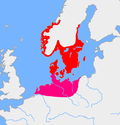of Unicode combining characters and Latin characters. The boukólos rule is a phonological rule of the Proto-Indo-European language (PIE). It states that... 4 KB (417 words) - 02:49, 21 February 2024 |
Grimm's law (redirect from Rask's-Grimm's rule) Proto-Indo-European, which continued to act as a surface filter. (See boukólos rule) Perhaps the usual reflex was *b (as suggested by the connection of... 22 KB (1,687 words) - 11:47, 24 March 2024 |
 | Before e. C(u) Before or after a (PIE) u (boukólos rule). C(O) Before or after a (PIE) o, u (boukólos rule). Cn− After n. CR Before a sonorant (r, l,... 111 KB (10,129 words) - 10:03, 26 April 2024 |
 | include the following. Delabialization of labiovelars next to /u/, the "boukólos rule". This was a phonotactic restriction already in Proto-Indo-European... 63 KB (6,758 words) - 06:12, 21 April 2024 |
when adjacent to *w (or its allophone *u), according to a rule known as the boukólos rule. The only certain PIE fricative phoneme *s was a strident sound... 48 KB (6,253 words) - 16:23, 18 April 2024 |
voiced consonant). The effects of the generally accepted synchronic boukólos rule whereby *kʷ becomes *k next to *u or *w are shown. The following is... 82 KB (7,771 words) - 13:34, 25 March 2024 |
 | Osco-Umbrian branch of Italic and sometimes in Greek and Germanic). The boukólos rule, however, states that a labiovelar reduces to a plain velar when it... 48 KB (5,862 words) - 19:55, 26 April 2024 |
place at a later date in each of those language families.: 269 Boukólos rule, a similar rule affecting labiovelar consonants in Proto-Indo-European Wenn... 15 KB (1,726 words) - 23:32, 23 March 2024 |
languages. A concise description is given for each rule; more details are given in their articles. boukólos rule Labiovelars lose their labialization and become... 9 KB (1,352 words) - 20:09, 18 February 2024 |
Ancient Greek accent (redirect from Ancient Greek rules of accent) when the penultimate syllable is short are usually paroxytone: βουκόλος boukólos 'cowherd' δορυφόρος doruphóros 'spear-bearer' δισκοβόλος diskobólos 'discus-thrower'... 151 KB (14,980 words) - 13:46, 23 January 2024 |
Vol. 64, No. 1 (März 2007), pp. 59–61. (JSTOR) From the Greek βουκόλος (boukólos) "looking after cattle". Bassett (1905). Raven (1965), pp. 102–103. The... 46 KB (6,472 words) - 15:41, 14 February 2024 |

